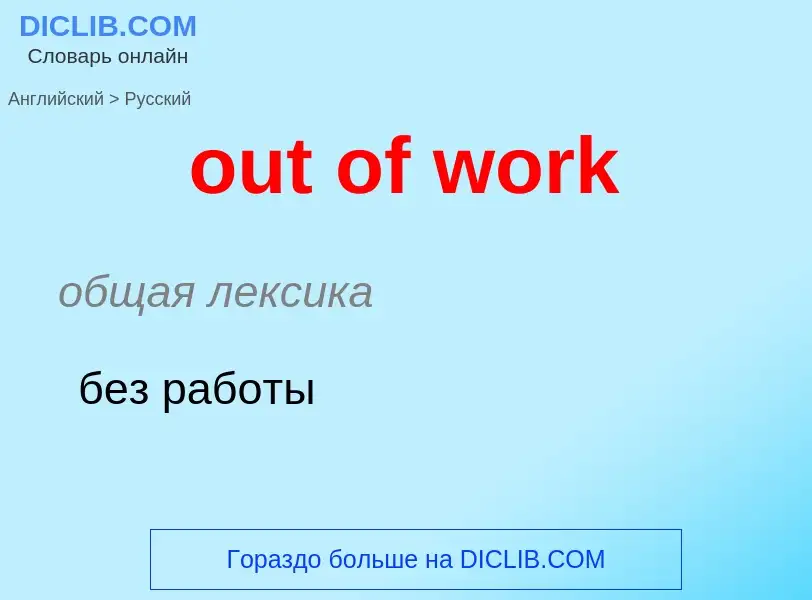Перевод и анализ слов искусственным интеллектом ChatGPT
На этой странице Вы можете получить подробный анализ слова или словосочетания, произведенный с помощью лучшей на сегодняшний день технологии искусственного интеллекта:
- как употребляется слово
- частота употребления
- используется оно чаще в устной или письменной речи
- варианты перевода слова
- примеры употребления (несколько фраз с переводом)
- этимология
out of work - перевод на русский
общая лексика
без работы
Определение
.
Википедия
Unemployment, according to the OECD (Organisation for Economic Co-operation and Development), is people above a specified age (usually 15) not being in paid employment or self-employment but currently available for work during the reference period.
Unemployment is measured by the unemployment rate, which is the number of people who are unemployed as a percentage of the labour force (the total number of people employed added to those unemployed).
Unemployment can have many sources, such as the following:
- new technologies and inventions
- the status of the economy, which can be influenced by a recession
- competition caused by globalization and international trade
- policies of the government
- regulation and market
Unemployment and the status of the economy can be influenced by a country through, for example, fiscal policy. Furthermore, the monetary authority of a country, such as the central bank, can influence the availability and cost for money through its monetary policy.
In addition to theories of unemployment, a few categorisations of unemployment are used for more precisely modelling the effects of unemployment within the economic system. Some of the main types of unemployment include structural unemployment, frictional unemployment, cyclical unemployment, involuntary unemployment and classical unemployment. Structural unemployment focuses on foundational problems in the economy and inefficiencies inherent in labor markets, including a mismatch between the supply and demand of laborers with necessary skill sets. Structural arguments emphasize causes and solutions related to disruptive technologies and globalization. Discussions of frictional unemployment focus on voluntary decisions to work based on individuals' valuation of their own work and how that compares to current wage rates added to the time and effort required to find a job. Causes and solutions for frictional unemployment often address job entry threshold and wage rates.
According to the UN's International Labour Organization (ILO), there were 172 million people worldwide (or 5% of the reported global workforce) without work in 2018.
Because of the difficulty in measuring the unemployment rate by, for example, using surveys (as in the United States) or through registered unemployed citizens (as in some European countries), statistical figures such as the employment-to-population ratio might be more suitable for evaluating the status of the workforce and the economy if they were based on people who are registered, for example, as taxpayers.

![A government unemployment office with job listings, [[West Berlin]], [[West Germany]], 1982 A government unemployment office with job listings, [[West Berlin]], [[West Germany]], 1982](https://commons.wikimedia.org/wiki/Special:FilePath/Bundesarchiv B 145 Bild-P109961, Berlin, Arbeitsamt Sonnenallee, Arbeitslose.jpg?width=200)
![Demonstration against unemployment in [[Kerala]], [[South India]], [[India]] on 27 January 2004 Demonstration against unemployment in [[Kerala]], [[South India]], [[India]] on 27 January 2004](https://commons.wikimedia.org/wiki/Special:FilePath/Dyfiharipadarally (32).jpg?width=200)
![''Migrant Mother'', photograph by [[Dorothea Lange]], 1936 ''Migrant Mother'', photograph by [[Dorothea Lange]], 1936](https://commons.wikimedia.org/wiki/Special:FilePath/Lange-MigrantMother02.jpg?width=200)


![Tompkins Square Park]], [[Manhattan]], [[New York City]], 1874 Tompkins Square Park]], [[Manhattan]], [[New York City]], 1874](https://commons.wikimedia.org/wiki/Special:FilePath/Tompkins square riot 1874.jpg?width=200)


![job vacancy]] and unemployment rate (from the US Bureau of Labor Statistics) job vacancy]] and unemployment rate (from the US Bureau of Labor Statistics)](https://commons.wikimedia.org/wiki/Special:FilePath/US beveridge 2004 through fall 2010.gif?width=200)
![Depression]]-era [[Chicago]], [[Illinois]], [[United States]], 1931 Depression]]-era [[Chicago]], [[Illinois]], [[United States]], 1931](https://commons.wikimedia.org/wiki/Special:FilePath/Unemployed men queued outside a depression soup kitchen opened in Chicago by Al Capone, 02-1931 - NARA - 541927.jpg?width=200)
![states]] states]]](https://commons.wikimedia.org/wiki/Special:FilePath/Unemployment in Germany 2003 by states.png?width=200)


